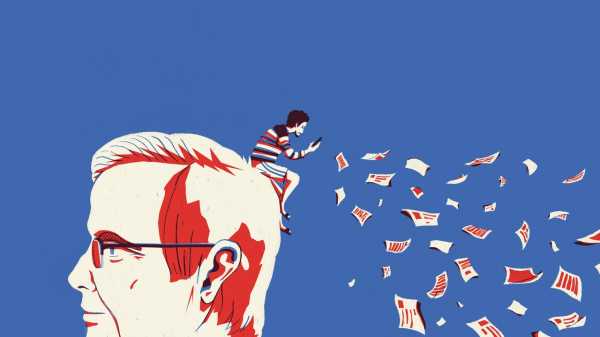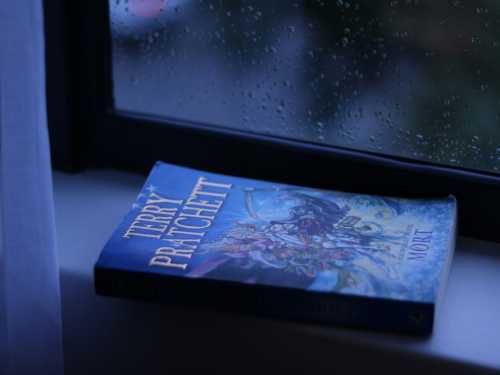
In the fall of 2015, I moved from Brooklyn to Vermont for a month to try to write something new. I had spent four years working on a novel—four years covering cocktail napkins with notes about the tiniest interpersonal dynamics among its various characters; the day I finished the final chapter, I wept. Now my agent was in New York, trying to sell it as I moved on to the next one. I’d been told throughout graduate school that getting an agent was the toughest hurdle on the road to publication. Every time my phone rang, I imagined that it was her, with good news. Sometimes it was her, but the news was never good.
Late one afternoon, as I was working in bed, the computer warm on my lap, she called again. I stood, hope blooming. She told me that all of the publishers we had tried had now considered the book, and all of them had turned it down. The plot, she kept hearing, wasn’t relatable; its concerns were too narrow. My vision tightened. I kneeled on the ground and pressed my chest against the bed’s unfamiliar mattress. The characters who had lived in my brain for years—an aspiring writer mourning the loss of his mother, an aspiring musician dealing with imposter syndrome—had suddenly suffocated.
I hung up the phone. I wanted to confess my failure, but there were few people I felt that I could talk to about it. I’d been in therapy for years, but my psychiatrist was in New York; I worried that my friends from graduate school would judge me unkindly. My parents were going through their own stress—my grandmother had recently been diagnosed with dementia—and I didn’t want to add to their burden. But maybe all that’s an excuse. Maybe I was just ashamed.
I called my girlfriend, in Brooklyn, who tried to comfort me. I spent most of the next day gazing listlessly out my window at a turbulent river. I napped on the scratchy rug. I stress-ate large chunks of bread. I stared blankly at replays of the Presidential-primary debates: Donald Trump bullying Jeb Bush, Hillary Clinton brushing off Bernie Sanders. I had imagined that my novel would provide the life I most wanted—a way to keep writing, to channel the thoughts that were bursting too loudly within me. I had failed.
Also, I had no clean laundry. I packed my dirty clothes into a rolling suitcase, which I dragged toward the town’s laundromat. A white pickup truck towing an empty flatbed trailer pulled up beside me as I was crossing the bridge over the river; the driver yelled a gay slur and whipped an egg in my direction. The truck ran a red light and sped off. I stared down at the yolk smearing the ground near my feet. It was all too much.
At the laundromat, shaky with fading adrenaline and the heavy gloom of catastrophe, I had a desperate impulse to confess my failure to a stranger, someone who didn’t know any of my friends or family, someone who probably didn’t care about literary fiction at all. I was sitting in a flimsy blue plastic bucket chair, waiting for my clothes. I rested my elbows on my thighs and began writing an e-mail on my phone:
Mr. Bush,
I thought I might ask you for some advice on a difficult, private subject. After four years of work . . . it’s looking like my first novel won’t be published. I’ve come as close as is possible to success without succeeding . . . how does one keep his head up in such a jarring failure? I have nightmares about the first book. It stalks my new novel like a ghost.
Thank you for your time,
AD
I had never e-mailed Jeb Bush before, but, earlier that week, he’d told the residents of New Hampshire to contact him if they had problems that they felt he could help with—a generous invitation that I had read about online. By that point in the campaign cycle, Jeb, the most recently anointed son of George H. W. Bush, was flailing. He had become an object of national Schadenfreude as Trump badgered him to the periphery in the course of several televised debates. I hadn’t felt particularly bad for him; his record as governor of Florida—the Terri Schiavo incident, his stance on same-sex marriage—did not impress me, and I had protested his older brother’s actions throughout the early two-thousands. But the political gulf between us only made writing to him more appealing: I was desperate to verbalize my failure in a way that was sure not to elicit judgment; I didn’t think that Jeb would read what I wrote, and, even if he did, I didn’t care what he thought about me.
I hit send and immediately felt a little bit better. My shame had been a crawling, active thing, invading my chest late at night in my freezing Vermont bedroom, forcing me at random moments to grab at my shirt and grit my teeth so hard that they squeaked. Writing the e-mail had expelled the creature for a few minutes. And I’d written something, something honest, after feeling that I couldn’t—and maybe shouldn’t—ever write again.
Jeb did not respond. Soon afterward, I returned to New York. When a dream fails, nothing changes, except that the world becomes gray, without the potential for color shift. Life that December was bleak and overwhelming. My girlfriend and I had just moved into a new apartment; microscopic, self-inflicted fractures were setting into our relationship. My grandmother had been moved to a care facility and didn’t like her drab new environs. One day, she complained that there were “too many old people” there. She was ninety-three.
I come from an artistically inclined family—the Dalva side of my family deals antiques, and my mother is a dance critic. I felt that I’d let them down. Jeb was also falling short of the heights his relatives had reached. He was polling around three per cent, and he’d been unable to refute Trump’s consistent refrain that he was “low energy.” “For him to get things done is hard,” Trump said, of Jeb. I sympathized.
Every night, in my new apartment, I tried to start over with my writing, but I couldn’t. I’d always been an isolated overachiever, the type of lonely kid who obsesses over an A- on a spelling test. I didn’t know how to process a failure of this magnitude. It seems like a minor concern, not selling a novel—and it is. Unless it happens to you.
The inability to write was agonizing, and I remained incapable of talking about it with anyone in my life. In January, 2016, I e-mailed Jeb again.
Dear Mr. Bush,
. . . How, in the past, have you overcome career setbacks? I’m at a bit of a crossroads right now. I spent three years working on a project that ended up not going as I hoped. Though I think the experience has left me more skilled than ever, the idea of starting over seems daunting. I know that chipping away at something every day is no Sisyphean task, but I feel so stagnant. How does one sustain morale and effort in such a situation?
thank you,
AD
Shortly after sending that message, I went to a friend’s book launch. I felt invisible and too visible at once. It seemed embarrassing to have dreamed at all. I hovered for a while near an assortment of fizzy grocery-store wines in tiny plastic glasses, then left. I left many parties that year. I left friends, too, because it was painful to reëxperience failure in each new encounter.
Jeb appeared to be suffering an identity crisis as well. In his campaign signage, there was an exclamation point at the end of his name—which had always seemed a little silly but now registered as manic, overcompensating. At a rally in New Hampshire, in February, he said, “I think the next President needs to be a lot quieter but send a signal that we’re prepared to act in the national-security interest of this country.” He added, with emphasis, that we needed “to get back in the business of creating a more peaceful world.” The audience, captured on a video clip that would soon go viral, stared silently into space. There was an excruciating pause; Jeb rubbed his hands together and bent forward, at an odd angle, his arms slumped. “Please clap,” he said, in a more human tone, before smiling sheepishly and looking off to the side as the crowd meekly applauded. I knew that smile well. It was one I often wore myself.
Jeb finished fourth in New Hampshire and South Carolina, then dropped out of the race. It was right around this time that I began—carefully, tentatively—to write again. A piece of flash fiction, a short essay. I started treating Jeb’s e-mail address like a private journal, contacting him around the first of each month. It gave me a routine and boosted my confidence. Also, the e-mails often gave me clarity as I wrestled with situations that I felt unable to discuss honestly with the people in my life.
Dear Mr. Bush,
. . . My question: I’m not sure if it’s the seasonal depression that comes with February, or the frustration of having people in my field (writing) who I considered peers soaring past me, or even just plain old laziness, but I’m having trouble focusing on my work lately . . . Do you have any tricks to break through stagnancy? . . .
AD
Dear Jeb,
. . . I’m struggling with a problem—I’m writing a piece on the American author Joseph McElroy and when I reached out to him for an interview, he reacted with distrust and said he would prefer to be emailed only.
Dear Jeb,
today is my birthday and I’m wondering: how did you know when you were an adult?
As Trump became omnipresent in American life and Jeb became a national symbol of failure, I felt increasingly aligned with my unwitting amanuensis. A photo of him leaning backward, his eyes closed and his arms outspread, became a meme. In perhaps the most popular version, he was superimposed on an electoral map, all the states having voted for him: the ironic image of triumph.
A few months after the election, my grandmother died. I wrote to Jeb about her—but, immediately after sending that message, I deleted it from my out-box, embarrassed to have shared something so raw, even with what I believed was a defunct campaign e-mail address. As best I can remember, I had written about a dream that I had concerning my grandmother soon after she died. I was in a jeep, driving along a beach at night. By the glare of my headlights, I saw my grandmother’s tiny frame, platform sneakers thrown over her shoulders, her bare feet in the white sand. She turned and looked at me, glowing in the darkness. She waved happily. But I hadn’t picked her up. I kept on driving.
Halfway through 2017, I wrote to Jeb about another secret, one that filled me with shame. I had never shared it with anyone.
Dear Jeb,
I have a bit of a dilemma this month—I’ve been happy with my girlfriend for years, but something has always been missing. I’m not quite sure what. Tonight I had a drink with a wonderful woman . . . I found myself clicking with her . . . suddenly I could see myself ten, fifteen, twenty years out. And yet my girlfriend gives me such stability, such warmth. And yet I’m sitting here writing this to you. . . . Has this ever happened to you, in your long marriage? How do you have such certitude that someone is right? What if—and I know this is wild—what if the woman I had that drink with is the one I’m meant to be with. . . .
But of course she might not even feel the same way about me!
How are you? . . .
AD
This latest failure, in love, felt like the betrayal of my own instincts; I kept wondering whether there was something wrong with me, because my girlfriend was a wonderful person. Soon after sending that letter to Jeb—a letter that, in hindsight, feels exaggerated—I realized that I was being unfair to her. It wasn’t right to stick around if I felt that something was missing. We broke up. When I washed the dishes on that first night alone, I was surprised to find that she’d taken the kitchen sink’s drain trap. All the little fragments I’d left behind disappeared into oblivion.
I continued writing to Jeb in the year that followed. At the beginning of 2018, I sold a book—not a novel but an illustrated modernization of “Oliver Twist,” which I had co-written. Now I needed to ask other writers to provide blurbs for the back cover, a task that I found nerve-racking.
Dear Jeb, happy 2018! I was hoping for some advice . . . am a bit nervous to reach out to my connections and mentors for blurbs. . . . I’ve always felt so guilty to be baldfaced, to simply ask for help, especially time-intensive help. What do you do when you need a favor from someone? How do you approach it?
thank you,
Adam
I sent the e-mail late in the afternoon, while working at my family’s antiques store. An hour later, a reply arrived in my in-box:
You need to simply ask for help and give people an out.
Jeb Bush
I staggered. My intimate journal, the repository of my deepest shames, had talked back to me. The overhead track lighting in the store’s gallery felt blinding. I replied automatically, without thought.
I will try that, thank you so much for your advice!
best,
Adam
Only then did a wave of thoughts and doubts and fears crash on my brain. Had Jeb read my other e-mails? The romantic confessions? Had I sent him a description of that weird Technicolor sex dream I’d had?
I thought, too, about what he had written. The advice was genuinely helpful. And it clarified, in my mind, why I had first written to him. Jeb Bush had an easier out than anyone I could have contacted. Friends feel obliged; therapists get paid; priests have a divine calling. Jeb Bush does not need to answer my e-mails.
But, now, he had. Oh, God, I thought. I’ll never write to Jeb again.
Recently, I began to write a new novel. I didn’t experience a great epiphany—just a glimmer of the same spark I remembered from years ago, the fun of making art. I began waking up early to write. And, for the first time, I felt able to confess to people that, a few years ago, on my first try, I had written a novel that nobody wanted. I started writing an essay about it—this one.
As the draft took shape, I realized that I would need to figure out whether I had actually been corresponding with Jeb Bush all that time. I wrote to the usual e-mail address and, this time, I requested an interview. He replied the next day.
I am not sure how i can help you with your essay since i didnt do anything!!! Happy to speak or do it via email but i dont know what value i can add.
Jeb Bush
I told him that I’d love to talk anyway and that we could do it on Zoom. He was more flexible and accommodating than members of my immediate family: less than a week later, a little more than six years after I had sat in a laundromat in Vermont with egg on my sneakers, I put on a tasteful sweater and sat down at my kitchen table. My laptop screen flashed, and there he was, calling in from “Jeb’s iPad (2).” The iPad’s camera was at a low angle, and there was a world map behind him on the wall. His curtains were mostly closed against the sun. He was wearing a black polo shirt. “Hello,” he said.
I did my best to recount my side of the story. Jeb explained that he first started giving out his e-mail address in 1999—in fact, he’d written a book collecting the e-mails he’d received as governor of Florida. He self-published it, an approach I’d never considered for my own work. When he shared the e-mail address during the Presidential campaign, he went on, something shifted in the messages he received. “I remember a lot of stupid people—or people with stupid thoughts, let’s put it that way, trying to be cool with their friends, probably.” He seemed to have become a minor cult figure among nerds on the Internet. “For a while, there were a lot of kids with Cheeto stains on their T-shirts, basically.”
I peeked down at my sweater in momentary concern. He noticed, and we both laughed. “I don’t get as many now,” he said, with what struck me as a hint of wistfulness. I asked, a bit timidly, whether he remembered responding to my e-mail about asking people for help.
“No, I don’t remember saying it, but that’s pretty good advice,” he said. He had no memory of me whatsoever, it turned out. I told him that his e-mail had been useful. I also told him that I had generally found it easier to contact him when I was in crisis, rather than talking to my friends.
“I’m not sure that’s particularly helpful,” he replied, sounding firm. “I think you might want to ask your best friends for advice.”
“Is there someone you go to for advice?” I asked.
“I go to my wife, for sure. And I go to my older brother for certain things—my much older brother, George W.” He reflected on this a bit more. “I generally figure things out myself,” he said. “I don’t know. That’s a little weird. I haven’t thought about that.” He stared off into the middle distance. “I’m going to have to start thinking about that now.”
I tried to describe how, when my novel hadn’t sold, my public self became severed from my private identity. He said he hadn’t had that experience, that his private and public selves remained unified when he was running for office. He added that this “may explain why I wasn’t a great candidate.”
Then, he flipped the interview and asked me a question. “So, you tried,” he said. “Had you not tried, how would you feel?”
“Worse,” I said, instantly.
“Yeah—or maybe not,” he replied, surprising me. “You tried, and a lot of people don’t, and you should feel quiet comfort about that. And look, man, life goes on. It’s a journey, man. It didn’t happen,” he said, seemingly pivoting back to his electoral failure without my prompting. “What am I supposed to do? Go in the fetal position and suck my thumb and hold on to my little blankie and say, ‘Woe is me’?”
I pulled up the first e-mail I wrote to him, from the laundromat, and read it aloud. I asked him what he would have written back to me had he noticed it.
“I’m glad I didn’t say this at the time,” he said, “because you sound like you were in a deeply pessimistic state. I would’ve said, ‘Put your big-boy pants on, dust them off, and get back into the game, man.’ ”
“It’s good that you didn’t say that,” I agreed. Far more useful to my life, it turned out, was Jeb’s silence. It left me room to gradually work through my failure.
Our chat on Zoom ended pleasantly. The next day, a package arrived at my apartment in a Priority Mail envelope, with a Florida return address. Inside was the self-published book of Jeb’s e-mails. It had come out, I saw, in October, 2015, shortly before I’d written to him the first time. It’s an odd, dryly recursive book, with a foreword by Jeb’s wife, Columba.
There was also a note:
Dear Adam:
Nice talking to you today. Here is Reply All that I mentioned during our conversation.
Sincerely,
Jeb.
I never responded. ♦
Sourse: newyorker.com






